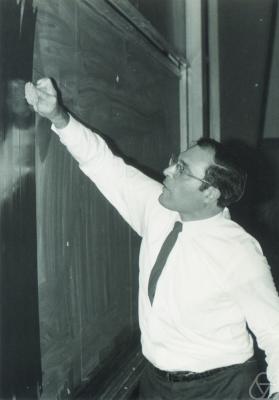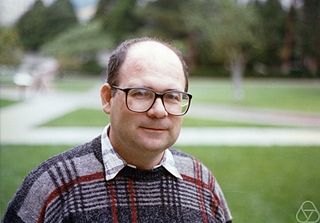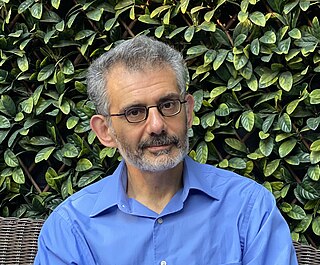Combinatorics is an area of mathematics primarily concerned with counting, both as a means and as an end to obtaining results, and certain properties of finite structures. It is closely related to many other areas of mathematics and has many applications ranging from logic to statistical physics and from evolutionary biology to computer science.

Gian-Carlo Rota was an Italian-American mathematician and philosopher. He spent most of his career at the Massachusetts Institute of Technology, where he worked in combinatorics, functional analysis, probability theory, and phenomenology.
Free probability is a mathematical theory that studies non-commutative random variables. The "freeness" or free independence property is the analogue of the classical notion of independence, and it is connected with free products. This theory was initiated by Dan Voiculescu around 1986 in order to attack the free group factors isomorphism problem, an important unsolved problem in the theory of operator algebras. Given a free group on some number of generators, we can consider the von Neumann algebra generated by the group algebra, which is a type II1 factor. The isomorphism problem asks whether these are isomorphic for different numbers of generators. It is not even known if any two free group factors are isomorphic. This is similar to Tarski's free group problem, which asks whether two different non-abelian finitely generated free groups have the same elementary theory.

Terence Chi-Shen Tao is an Australian mathematician who is a professor of mathematics at the University of California, Los Angeles (UCLA), where he holds the James and Carol Collins chair. His research includes topics in harmonic analysis, partial differential equations, algebraic combinatorics, arithmetic combinatorics, geometric combinatorics, probability theory, compressed sensing and analytic number theory.
In probability theory and mathematical physics, a random matrix is a matrix-valued random variable—that is, a matrix in which some or all of its entries are sampled randomly from a probability distribution. Random matrix theory (RMT) is the study of properties of random matrices, often as they become large. RMT provides techniques like mean-field theory, diagrammatic methods, the cavity method, or the replica method to compute quantities like traces, spectral densities, or scalar products between eigenvectors. Many physical phenomena, such as the spectrum of nuclei of heavy atoms, the thermal conductivity of a lattice, or the emergence of quantum chaos, can be modeled mathematically as problems concerning large, random matrices.
Lloyd Nicholas Trefethen is an American mathematician, professor of numerical analysis and head of the Numerical Analysis Group at the Mathematical Institute, University of Oxford.

Dan-Virgil Voiculescu is a Romanian professor of mathematics at the University of California, Berkeley. He has worked in single operator theory, operator K-theory and von Neumann algebras. More recently, he developed free probability theory.
Free convolution is the free probability analog of the classical notion of convolution of probability measures. Due to the non-commutative nature of free probability theory, one has to talk separately about additive and multiplicative free convolution, which arise from addition and multiplication of free random variables. These operations have some interpretations in terms of empirical spectral measures of random matrices.
In mathematics, a Rota–Baxter algebra is an associative algebra, together with a particular linear map R which satisfies the Rota–Baxter identity. It appeared first in the work of the American mathematician Glen E. Baxter in the realm of probability theory. Baxter's work was further explored from different angles by Gian-Carlo Rota, Pierre Cartier, and Frederic V. Atkinson, among others. Baxter’s derivation of this identity that later bore his name emanated from some of the fundamental results of the famous probabilist Frank Spitzer in random walk theory.
Glen Earl Baxter was an American mathematician.
In the mathematical theory of free probability, the notion of free independence was introduced by Dan Voiculescu. The definition of free independence is parallel to the classical definition of independence, except that the role of Cartesian products of measure spaces is played by the notion of a free product of (non-commutative) probability spaces.
In the mathematical field of functional analysis, a nuclear C*-algebra is a C*-algebra A such that for every C*-algebra B the injective and projective C*-cross norms coincides on the algebraic tensor product A⊗B and the completion of A⊗B with respect to this norm is a C*-algebra. This property was first studied by Takesaki (1964) under the name "Property T", which is not related to Kazhdan's property T.
In physics, quantum dynamics is the quantum version of classical dynamics. Quantum dynamics deals with the motions, and energy and momentum exchanges of systems whose behavior is governed by the laws of quantum mechanics. Quantum dynamics is relevant for burgeoning fields, such as quantum computing and atomic optics.

Gilles I. Pisier is a professor of mathematics at the Pierre and Marie Curie University and a distinguished professor and A.G. and M.E. Owen Chair of Mathematics at the Texas A&M University. He is known for his contributions to several fields of mathematics, including functional analysis, probability theory, harmonic analysis, and operator theory. He has also made fundamental contributions to the theory of C*-algebras. Gilles is the younger brother of French actress Marie-France Pisier.
Dominique de Caen was a mathematician, Doctor of Mathematics, and professor of Mathematics, who specialized in graph theory, probability, and information theory. He is renowned for his research on Turán's extremal problem for hypergraphs.

Joachim Cuntz is a German mathematician, currently a professor at the University of Münster.

Alan Stuart Edelman is an American mathematician and computer scientist. He is a professor of applied mathematics at the Massachusetts Institute of Technology (MIT) and a Principal Investigator at the MIT Computer Science and Artificial Intelligence Laboratory (CSAIL) where he leads a group in applied computing. In 2004, he founded a business called Interactive Supercomputing which was later acquired by Microsoft. Edelman is a fellow of American Mathematical Society (AMS), Society for Industrial and Applied Mathematics (SIAM), Institute of Electrical and Electronics Engineers (IEEE), and Association for Computing Machinery (ACM), for his contributions in numerical linear algebra, computational science, parallel computing, and random matrix theory. He is one of the creators of the technical programming language Julia.

Alice Guionnet is a French mathematician known for her work in probability theory, in particular on large random matrices.

Ilijas Farah is a Canadian-Serbian mathematician and a professor of mathematics at York University in Toronto and at the Mathematical Institute of Serbian Academy of Sciences and Arts, Belgrade, Serbia. His research focuses on applications of logic to operator algebras.

Wolfgang Krieger is a German mathematician, specializing in analysis.









